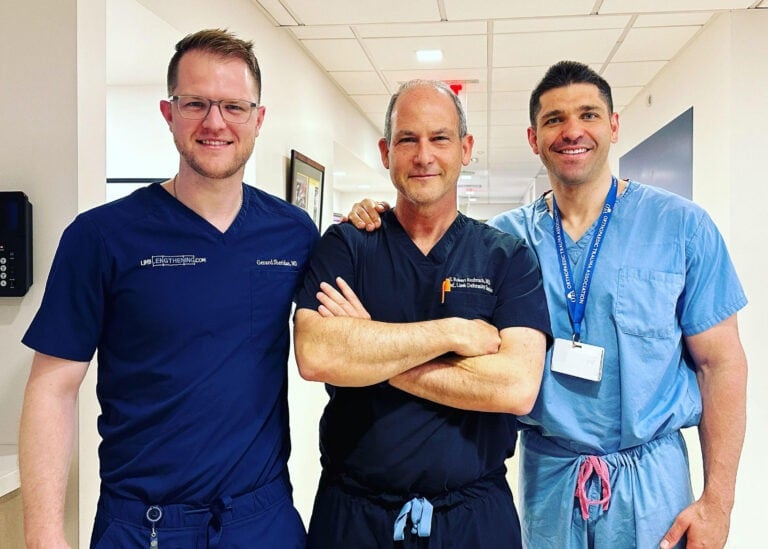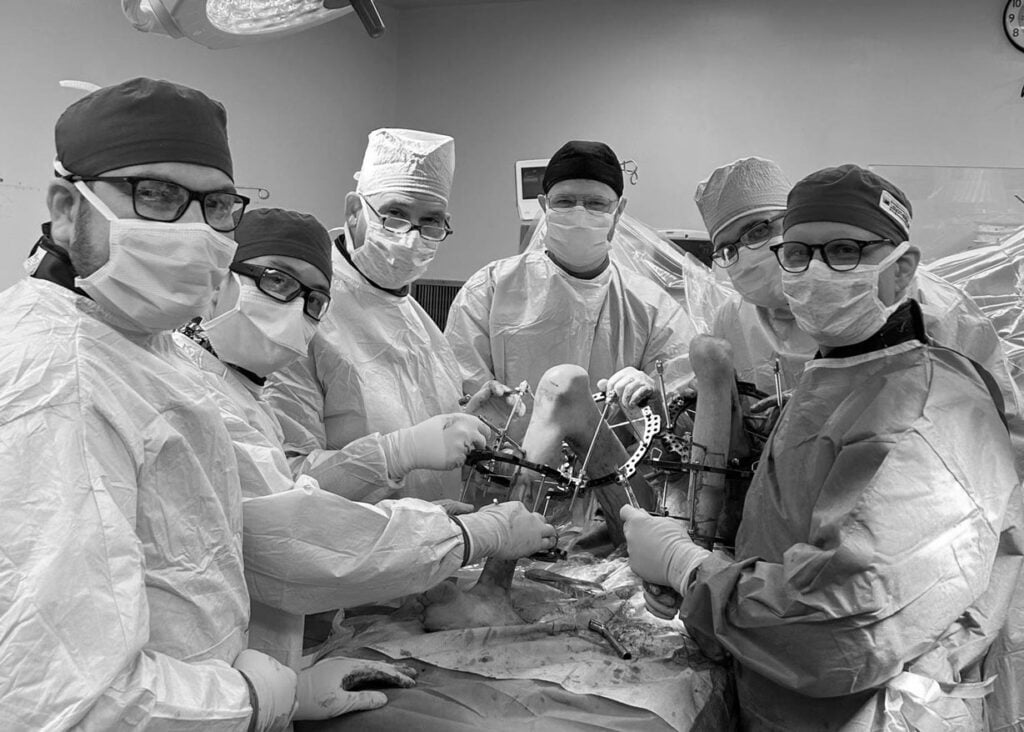Limb Lengthening and Complex Reconstruction Fellowship
Department of Orthopaedic Surgery
Austin T. Fragomen, MD, Fellowship Director, Limb Lengthening and Complex Reconstruction Service
S. Robert Rozbruch, MD, Chair, Limb Lengthening and Complex Reconstruction Service
Taylor J. Reif, MD, Director of Education, Limb Lengthening and Complex Reconstruction Service
Jason S. Hoellwarth, MD, Director of Research, Limb Lengthening and Complex Reconstruction Service
Duration: 1 year (August 1–July 31)
Stipend: $103,880.85 per annum/benefits (subsidized housing also available)
Positions: 2 Non-accredited
Location: Hospital for Special Surgery
Contact: Jennifer Johnson, 212.606.1594, johnsonj@hss.edu
Fellows immediately become a part of our team which includes four attending surgeons, along with PA’s, nurses, and research assistants. Fellow’s responsibilities prioritize patient care and education. The fellow will gain clinical expertise in diagnosis, treatment options, and surgery and will advance their research experience. The Ilizarov method is extensively used and applied to conventional approaches. We use an apprenticeship model which instills in the learner a profound skill set in preoperative planning, surgical precision, and postoperative care. The research opportunities focus on clinical investigations with the objective of a poster presentation at the HSS fellow research competition and abstract presentation at the Limb Lengthening & Reconstruction Society (LLRS) in July of the graduation year.
Curriculum and Expectations
 Fellows will gain experience with the following:
Fellows will gain experience with the following:
- Adult and pediatric limb lengthening and deformity correction
- Lower extremity limb reconstruction: hip, femur, knee, tibia, ankle and foot
- Congenital conditions including fibular hemimelia, hemiatrophy dwarfism, short stature
- Developmental conditions: growth disturbance from trauma or infection in pediatric and adult patients
- The Ilizarov method
- Deformity analysis and detailed pre-operative planning
- Trauma: post-traumatic reconstruction: malunions, nonunions (septic and aseptic), bone defects, osteomyelitis, fracture related infection, complex circular fixation methods
- Knee reconstruction: osteotomy for realignment, arthrodesis
- Foot and ankle reconstruction: complex ankle fusions, multiplanar deformity correction, ankle distraction arthroplasty
- Upper extremity: humeral lengthening, forearm and wrist deformity correction
- Limb salvage surgery, infection, bone defect management
- Amputation reconstruction surgery, Osseointegration, Targeted Muscle Reinnervation (TMR), Regenerative Peripheral Nerve Interface (RPNI) surgery
- Tumor surgery, primary and secondary reconstruction
- Procedures: Hexapod circular external fixation (TSF and MaxFrame AutoStrut),Cable transport, Precice Bone Transport nail, intramedullary nail and plate assisted deformity correction, PRECICE magnetic internal lengthening nail, advanced blocking screw use, Osseointegration, PSI (NewClip and BodyCad), and preparation of antibiotic loaded cement/ceramic nails
- Complication management: soft-tissue releases, nerve decompression, residual deformity management
Application Process
The next available positions are for the coming academic year. Fill out the application form to apply.
Application Deadline: We use a rolling admissions approach. Interviews and acceptances occur constantly.
Learn about the application process.
What Our Fellows are Saying

“I was fortunate to complete the limb lengthening and complex reconstruction fellowship following my orthopaedic traumatology fellowship at HSS where I learned acute fracture management and nonunion techniques from a traumatologist perspective. This complemented my orthopaedic surgery residency training in Texas where I managed a considerable amount of high acuity blunt and penetrating trauma. We frequently encountered grossly contaminated fractures sustained in farm and ATV injuries. These were commonly managed with repeated debridement and open fixation destined for chronic infection. After seeing many patients undergo multiple surgeries for recalcitrant chronic osteomyelitis, I became interested in finding other options to treat these injuries hoping to mitigate the number of surgeries and improve patient outcomes. The utilization of distraction osteogenesis after treating these injuries with aggressive debridement of contaminated necrotic bone, inspired me to learn more. This interest festered early in the COVID-19 pandemic and since I had so much free time, I fed that interest with online courses. My interest in the LLCRS fellowship developed while attending a virtual trauma osteotomy/deformity course listening to one of the LLCRS alumni, Mitchell Bernstein, MD.

It has provided me with a new outlook on the management of nonunions, malunions, leg length discrepancies, chronic osteomyelitis, hindfoot reconstruction, amputation, and so much more. Some of the useful tools I have taken from this fellowship are a new approach to nonunion management, distraction osteogenesis, infection eradication techniques, arthrodesis with nails and frames, osseointegration, and the ability to understand a deformity and how to treat. My understanding and ability to effectively prepare and execute a pre-operative plan for complex cases has radically improved. My ability to utilize new technology such as the internal lengthening nail and hexapod fixators now provides me with a solution for virtually any problem I may encounter in practice. Most importantly I have learned how to perform these surgeries safely and when to perform prophylactic procedures. The relationships I forged with Drs. Rozbruch, Fragomen, Reif, and Hoellwarth are mentorships I will relish and maintain throughout my career. I will emulate qualities from each of them in my practice and surely be calling for advice with complex cases. The LLCRS fellowship compliments virtually all subspecialties; however, it is particularly useful for a traumatologist and highly recommend this to others interested.
– Brian Joseph Page, MD
LLCRS Fellow 2022-2023
12/24/2024
The Limb Lengthening and Complex Reconstruction Fellowship at the Hospital for Special Surgery (HSS) is an exceptional program that offers unparalleled training and experience in one of the most specialized fields of orthopedics. The fellowship is structured to deliver comprehensive training under the mentorship of world-renowned surgeons Dr. Rozbruch and Dr. Fragomen. There is also the opportunity to work with their junior partners Dr. Reif and Dr. Hoellwarth who are emerging leaders in their own right. The faculty are not only highly skilled but also deeply invested in the education and professional development of their fellows.
I entered this fellowship after completing a well regarded fellowship in orthopedic trauma, and hoped that the experience would provide an elegant capstone to my training and prepare me to more capably deal with complex acute and post-traumatic reconstructive cases. Instead, the experience completely reshaped my thinking and foundations as an orthopedic surgeon from the ground up. This fellowship redefined how I evaluate patients in clinic, pre-op plan, operate, and how I think about orthopedic pathology.
The most unique aspect to the training is how flexible and open minded Dr. Rozbruch and Dr. Fragomen are as surgeons. They are not constrained by algorithmic approaches or common thinking, and consider each patient individually after a comprehensive and systematic clinical, radiological evaluation and discussion of the patients goals. They have so many techniques in their armamentarium, they are simply not bound by one way of doing things. The complexity of cases sent to them from around the world requires such an approach. They are constantly innovating and improving, and their vast experience and skills allows them to do so safely and effectively. To experience orthopedics practiced in this manner was an eye opening and liberating experience that has enabled me to tackle complexity with confidence and innovate in my own practice.
The clinic experience is very well designed in that you have the opportunity to evaluate new patients and followups first on your own, formulate a plan, discuss and have it critiqued; but then you attend and observe Dr. Rozbruch or Dr. Fragomen as they repeat those steps and complete their clinical interaction with the patient. I cannot overstate how impactful and helpful this was in preparing me for practice, and in retrospect I consider this a neglected area in my prior training. This experience has profoundly shaped how I interact with patients, and allowed me to build the required knowledge and skills to evaluate, plan, and provide ongoing care for patients requiring complex and multi-stage reconstructive procedures.
In the operating room, I learned a vast array of deformity correction techniques, internal and external fixation including ring fixators and hexapod systems, limb lengthening, bone transport, infection management, fusions, osseointegration, robotic surgery, and others. Beyond specific procedures, I learned and honed general surgical skills that have improved all the surgery I now do. Dr. Rozbruch and Dr. Fragomen are master surgeons with high expectations and do a great job imparting their skills onto their fellows. This is a fellowship where you learn directly from masters, rather than struggle on your own. The direct surgical involvement increased with time and was proportional to my knowledge and ability growth. I am now confidently applying and teaching these techniques in practice.
Research is another key component of the fellowship. There were ample resources for fellows to pursue clinical or basic science research projects. With access to a vast patient database and invaluable mentorship from the de facto leaders in the field, fellows are well positioned to successfully carry out, present, and publish meaningful research works. The weekly didactic teaching is also very helpful in building foundational knowledge and having more detailed discussions around specific or emerging topics.
Beyond all the learning, the fellowship year was also a fantastic experience that I enjoyed tremendously throughout and am very grateful to have had.
David Burns MD PhD
